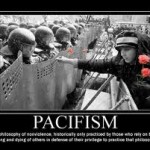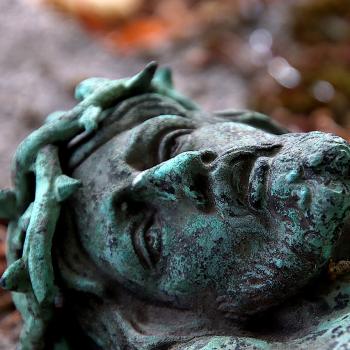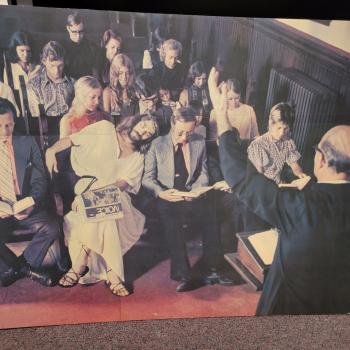Lest one think, in light of Wright’s strong conviction that Paul is critiquing the Imperial Cult, that Wright is actually an advocate of Paul being seen as something of a subversive or a political revolutionary in general, the following should lay such concerns to rest. He says “Yet I believe in the last analysis Paul did affirm the goodness, the God-givenness, of human structures of authority, even while at the same time undermining, through central aspects of his theology, the hubris, idolatry, blasphemy and other wickednesses which, as a Jew, never mind as a follower of Jesus, he associated with the arrogance and swagger of Rome.. To say that a particular police force is riddled with corruption, racism, or collusion with organized crime is not say ‘therefore we should have no police force’…. The answer to corrupt authorities is not anarchy. Paul, once again as a good creational monotheist, would not suggest such a thing; that is what is underneath his strong affirmations, so shocking to some liberal democrats, never mind Anabaptist, in Rom. 13.1-7…Creational monotheism entails a strong statement about the God-givenness of human structures, even while at the same time also indicating that the one God will hold the office-holders to account.” (p. 381).
Wright is an honest scholar, and so despite his proclivity to read between the Pauline lines and find more of a critique of the Imperial cult than may be there, he also admits “The fact that some cities were being redesigned to highlight the imperial architecture produced, so far as we know, no written comment from him. Nor did he explicitly mention the coins with their basically blasphemous inscriptions: Caesar as Pontifex Maximus and Divi Filius.” (p. 383). Exactly so. This is because Paul thinks the real enemy is of a supernatural sort, just as he thinks that the real solution is the coming Kingdom of God, not power politics. While it is true, that the story Paul is telling of Christ is a story which indirectly challenges the imperial rhetoric of the Aeneid and other sources, it is not a directly reactionary story, but a story told on the basis of first principles and Biblical accounts. Furthermore, the story Paul is telling, he is quite convinced, will have a inevitable historical conclusion when Christ returns. In that sense, the story the Emperor is now telling is temporal, temporary, and ultimately irrelevant. Empires rise and Empires fall in this ‘present evil age’ but the ‘age to come’ is already breaking into the present, making obsolete the rhetoric of human empire. Because Paul has such faith in God’s future on earth, he only feels the need to critique the emperor or empire at the point of its idolatry and corruption, not as an institution in itself.
I entirely agree with the thrust of pp. 383ff. in Tom’s magnum opus. What is central to Paul’s worldview is not merely Christ but “the fact of a new community, a community which transcended the boundaries of class, ethnic origin, location, and (not least) gender, by all of which the pagan world in general, and the imperial world in particular set so much store.” (p. 383). Paul is content to focus on Christ and his people and ‘turn the world upside down’ not by focusing on the world, but by building this positive new, inclusive community. So when Paul says Jesus is the risen Lord, this is at once a historical claim, and indirectly a critique of all other so-called lords, including of course the Emperor. Since in 1 Cor. 8, Paul does not single out the Emperor as the foil for his Christian Shema, but rather says there are gods many and lords many in the pagan world, in contrast to the one God the Father, and the one Lord Jesus Christ, the focus of his polemic is on any kind of idolatry, not just the Imperial claims and forms. In short, he does not seem to be just contrast Christ as the reality of which the Emperor is the parody, though that is true enough as well (but see p., 384). Wright is correct that Paul is arguing that ‘because there is only one God, there should only be one human family, a family united by faith in Christ, and whatever boundary markers that prevent slave and free, male and female, Jew and Gentile from being united, they have to go! Paul is trying to foster union and unity in Christ, and this involves some pretty radical social implications for institutions like slavery and patriarchy, not to mention implications for the boundary rituals of Judaism.
Wright, quoting David Horrell to good effect, reminds us that this is nothing like modern ideas of ‘tolerance’ of differences. “Paul’s tolerance operates within the framework of an intolerance that insists on Christ alone as the basis for community solidarity, a basis which also implies the proscription of actions deemed to threaten this union'” (p. 390). Exactly so. Furthermore, “the symbol of unity is precisely a unity in the Messiah….It does not answer to a hypothetical unity of all humans. Paul may have been ‘born out of due time’ as he says, but he was certainly not an eighteenth century liberal.” (p. 397).
Paul’s theology and praxis is now grounded in and guided by ‘a being in Christ’ which among other things, turns some form absolutes into adiaphora, such that he could say I can be the Jew to the Jew…… which is a very odd thing for a Jewish former Pharisee to say, unless he now sees his primary identity as something else— namely being a new creature in Christ. Here it would have been good if Tom could have dialogued with social identity theory, and Paul Trebilico’s recent work, and the work of Aaron Kuecker on allocentric identity, or what is sometimes called secondary identity and what happens when it becomes the primary identity.
The discussion on what happens when a load bearing idea or practice becomes adiaphora, something indifferent, something no longer required of the believer (like circumcision, or abstaining from idol meat bought at the meat market) on pp. 398-400 is helpful, and I would draw your attention to it. I like how Tom puts it on p. 399 when he sees those who still have scruples about idol meat as having too sensitive a conscience, but he wants to makes sure they don’t get hurt as the masonry from the previous load bearing wall (namely food laws) comes tumbling down.
On p. 400, we have the strong assertion that Paul is not advocating super-cessionism, but rather completionism, if we can put it that way. “The markers of Paul’s ancestral Judaism fall away, as far as the ekklesia is concerned, because God has done at last the great thing which he had promised to the patriarchs, the thing for which Moses, the Psalms and the prophets had longed and prayed. The scaffolding which has protected both building and builders during its construction must now be taken down lest it spoil the view.”
Nevertheless, when something is fulfilled, then it is completed and done. This cannot help but sound like supercessionism to Jews who do not embrace Jesus as Messiah, then or now but rather continue to keep the Mosaic covenant.

















